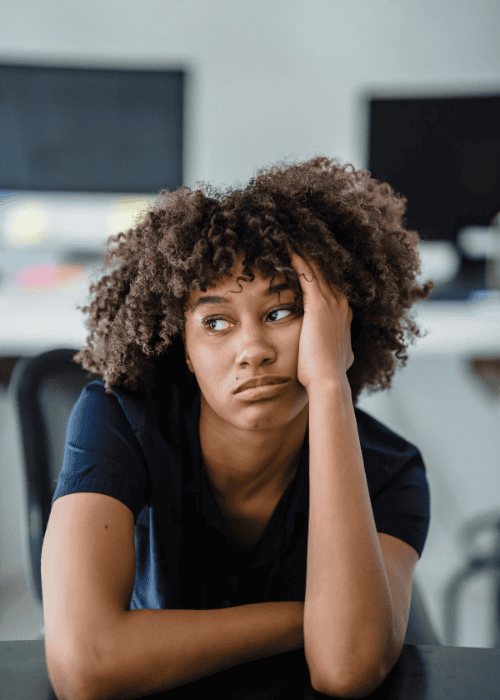Restlessness in Adults: Causes, Symptoms, and Solutions

We’ve all experienced times when we’re unable to relax, our minds are racing, and our bodies just won’t settle down. This is usually restlessness – a constant feeling of agitation that doesn’t seem to go away.
Though feeling restless is normal during times of stress, when it’s ongoing, it can cause significant physical and emotional health concerns. If persistent restlessness is causing you concerns, a mental health professional can help you get to the root of the issue.
This article can also serve as a guide for understanding restlessness in adults by exploring:
- What restlessness is and its common physical and emotional symptoms
- Causes of restlessness and its connection with mental health
- Therapy and coping strategies for restlessness
- Where to find professional support
- Answers to commonly asked questions about restless behavior

What Is Restlessness in Adults?
Restlessness is an inner state of feeling “antsy” or uneasy that can show up in our minds and bodies. For some people, it feels like an inability to sit still or relax; for others, it’s a constant mental “buzz” that makes concentration or relaxation nearly impossible.
While occasional restlessness is a normal human experience, chronic restlessness can interfere with quality of life. It can make it hard to focus, connect with others, or enjoy restful sleep. This is because, over time, the nervous system may remain in a heightened state of alertness – what many clinicians refer to as “hyperarousal”. Hyperarousal or hypervigilance can keep the body stuck in “go mode” even when there’s no clear reason to be on guard.
What Are Some Symptoms of Restlessness?
Restlessness can affect both the body and the mind, often creating a cycle where physical tension fuels emotional distress, and vice versa.
For many of us, restlessness begins subtly. For example, it might start with tapping a foot, tossing and turning in bed, or feeling the urge to do something even when there’s nothing urgent to do. It’s not uncommon for people to feel such energy levels during times of temporary stress. However, over time, persistent agitation could point to deeper issues, such as underlying mental health conditions and sleep issues that disrupt our balance and focus.
The symptoms of restlessness might include the following physical and emotional signs.
Physical Symptoms of Restlessness
Anxiety and restlessness look very similar. This might be because restlessness is often a symptom of stress and anxiety. So when you’re feeling restless, it can feel similar to when your nervous system is on high alert from stress.1Therefore, you might experience physical symptoms, such as:
- Muscle tension or tightness, especially in the neck, shoulders, or jaw
- Fidgeting, pacing, or difficulty sitting still
- Increased heart rate or shallow breathing
- Sweating, trembling, or feeling jittery
- Digestive changes, such as nausea or stomach discomfort
- Sleep disturbances and restlessness, including trouble falling asleep, frequent waking, or feeling unrested even after a full night’s sleep
When there is no real danger, the excess energy our bodies produce when stressed has nowhere to go, resulting in a continued feeling of restlessness or being unable to relax.
Emotional Symptoms of Restlessness
Aside from the physical symptoms that we can see and feel, restlessness may also shape how we think, feel, and behave.
The emotional symptoms of restlessness might include:
- Racing thoughts or being unable to turn the brain “off,” making it hard to focus or relax
- Feeling irritable or impatient, especially when there’s nothing else going on
- Being “on edge” or unable to unwind, even when things seem calm
- Feeling easily overwhelmed or mentally fatigued
- Difficulty concentrating or focusing
This kind of mental restlessness can also contribute to mental health and sleep issues, where the mind stays active long after the body wants to rest. Over time, it can lead to emotional exhaustion, burnout, or an increased risk of anxiety and depressive symptoms.
Common Causes of Restlessness in Adults
Restlessness and agitation can arise for many reasons, often due to a combination of physical, emotional, and environmental factors. Identifying these causes can help you get a sense of clarity toward understanding what might be going on.
The following sections discuss some of the common causes of restlessness in adults.
Stress and Anxiety
Stress and anxiety are major contributors to feeling restless. When our bodies perceive ongoing pressure or threat, whether from work demands, financial strain, or relationship tension, they can stay in a state of activation called the “fight-or-flight” response. This response floods the body with stress hormones like cortisol and adrenaline, creating feelings of jitteriness, muscle tension, and mental agitation.
Depression, Mood Disorders, and Other Mental Health Conditions
In fact, restlessness is especially common among those with schizophrenia or bipolar disorder, with 40.5% of people reporting moderate restlessness and 23.7% reporting severe restlessness.4
This psychomotor agitation often involves pacing, fidgeting, or feeling internally unsettled. Restlessness during bipolar disorder is likely to occur during manic or hypomanic phases, when energy levels surge and sleep becomes difficult.
ADHD and Neurodivergent Traits
Sleep Deprivation
Caffeine, Stimulants, or Medications
Additionally, antipsychotic medications are a common factor that contributes to restlessness, sometimes leading to a condition called “akathisia.” Researchers reported that around 18.5% of those receiving antipsychotics experience this.6
Medical Factors
As may be evident, restlessness rarely stems from one cause alone. It’s often a reflection of how the body and mind respond to life’s stressors. Therefore, restlessness may be an internal signal that something needs attention, whether this is physical rest, emotional support, or a shift in daily rhythm.
Therapy for Restless Behavior
By teaching the nervous system how to return to a balanced state, it’s possible to overcome restlessness. Below are some therapy approaches and strategies for overcoming restlessness.
Behavioral Therapy for Anxiety and Restlessness
Because restlessness often goes hand in hand with anxiety, behavioral therapy for anxiety is one of the most effective ways to address it.10 Cognitive behavioral therapy (CBT), for example, helps us identify thoughts that might increase anxiety and keep the body in a state of alertness. It also focuses on learning how to replace these unhelpful thoughts with more adaptive ones.
By replacing avoidance or overcontrol with mindful action, behavioral therapy helps us regulate stress responses and retrain the brain’s connection to calm.
Mindfulness Techniques For Relaxation
When the mind races and the body feels tense, relaxation techniques for adults can help slow down the stress cycle. Mindfulness-based therapies, yoga, and deep-breathing exercises teach you to stay present and observe sensations without reacting to them. For example, grounding exercises, body scans, or gentle stretching can:
Slow rapid breathing and calm heart rate- Help the body release muscle tension
- Increase tolerance for stillness and quiet
Mindfulness-based stress reduction (MBSR) may be especially effective if you’re struggling with anxiety and restlessness, as it can help you create a sense of safety in stillness.11
Emotional Regulation Techniques
Many of us experience restlessness because our nervous systems don’t know how to shift out of “high alert.” Learning emotional regulation techniques can help restore balance. Therapy can help with this process as it often focuses on:
Identifying triggers that cause agitation or mental overload- Using grounding exercises and breathwork to reduce physical activation
- Practicing self-compassion – acknowledging discomfort instead of fighting it
These techniques teach the body that it’s safe to relax, reducing cycles of overthinking and physical tension. Emotional regulation also supports better sleep, focus, and overall mental clarity.12
Lifestyle Adjustments and Daily Structure
Simple daily habits can have a significant impact on overcoming restlessness. Consider including the following practices in your daily habits:
Regular exercise, even brief walks, to help release energy and calm the mind13- Going to bed at the same time each night and limiting your screen time before sleep to support restful sleep
- Reducing caffeine, nicotine, and energy drinks to prevent physical agitation or jitteriness
Small adjustments such as these, especially when practiced consistently, can create long-term nervous system stability.
Mission Connection: Mental Health Treatment Options For Restlessness
At Mission Connection, we understand that restlessness can be more than just physical agitation – it’s often a sign of deeper emotional or psychological strain. Our team provides adult mental health support that addresses the full picture: mind, body, and environment.
Through a combination of evidence-based approaches, including CBT, mindfulness, and somatic therapy, we help clients uncover the root causes of restlessness and develop personalized strategies for calm and balance.
If restlessness has begun to affect your sleep, focus, or overall well-being, professional support can help. Contact Mission Connection today to learn how compassionate, integrative care can guide you toward lasting relief and emotional stability.

FAQs About Restlessness in Adults
While the aim of this page is to help you better understand restlessness in adults, it’s normal to still have some concerns. For this reason, we provide answers to some FAQs below.
1. Can Restlessness Be Caused by Physical Health Problems?
Yes, physical health problems can cause restlessness, such as thyroid issues or restless leg syndrome (often associated with low iron levels). Even some medications might cause restlessness, specifically antipsychotic medications.
2. How Can I Calm Down When I Feel Restless?
If you’re feeling restless, try some simple relaxation techniques, such as deep breathing, progressive muscle relaxation, or a short walk. These can help the body release pent-up energy.
3. Does Restlessness Go Away on Its Own?
Some restlessness can go away on its own. For example, restlessness that is caused by a stressful week or a big event usually passes with rest or after the event or stress has ended. But, more severe or constant restlessness may need additional support, whether through therapy or coping skills, to go away.
4. How Does Mission Connection Help Adults Experiencing Restlessness?
Using a combination of evidence-based approaches, like CBT and mindfulness, we can help you reduce restlessness and agitation by teaching you how to regulate your nervous system and improve relaxation. We also focus on addressing any underlying mental health or medical conditions that might be contributing to your restlessness. Ultimately, our goal is to help you reduce agitation so you can feel calm again.
References
- Russell, G., & Lightman, S. (2019). The human stress response. Nature Reviews Endocrinology, 15(9), 525–534. https://doi.org/10.1038/s41574-019-0228-0
- Chu, B., Marwaha, K., Sanvictores, T., Awosika, A. O., & Ayers, D. (2024, May 7). Physiology, stress reaction. StatPearls – NCBI Bookshelf. https://www.ncbi.nlm.nih.gov/books/NBK541120/
- Sacchetti, E., Valsecchi, P., Tamussi, E., Paulli, L., Morigi, R., & Vita, A. (2018). Psychomotor agitation in subjects hospitalized for an acute exacerbation of Schizophrenia. Psychiatry Research, 270, 357–364. https://doi.org/10.1016/j.psychres.2018.09.058
- Sörös, P., Hoxhaj, E., Borel, P., Sadohara, C., Feige, B., Matthies, S., Müller, H. H. O., Bachmann, K., Schulze, M., & Philipsen, A. (2019). Hyperactivity/restlessness is associated with increased functional connectivity in adults with ADHD: a dimensional analysis of resting state fMRI. BMC Psychiatry, 19(1). https://doi.org/10.1186/s12888-019-2031-9
- Krizan, Z., & Hisler, G. (2018). Sleepy anger: Restricted sleep amplifies angry feelings. Journal of Experimental Psychology General, 148(7), 1239–1250. https://doi.org/10.1037/xge0000522
- Berna, F., Misdrahi, D., Boyer, L., Aouizerate, B., Brunel, L., Capdevielle, D., Chereau, I., Danion, J., Dorey, J., Dubertret, C., Dubreucq, J., Faget, C., Gabayet, F., Lancon, C., Mallet, J., Rey, R., Passerieux, C., Schandrin, A., Schurhoff, F., Zinetti-Bertschy, A. (2015). Akathisia: prevalence and risk factors in a community-dwelling sample of patients with schizophrenia. Results from the FACE-SZ dataset. Schizophrenia Research, 169(1–3), 255–261. https://doi.org/10.1016/j.schres.2015.10.040
- Loke, W. H., Hinrichs, J. V., & Ghoneim, M. M. (1985). Caffeine and diazepam: Separate and combined effects on mood, memory, and psychomotor performance. Psychopharmacology, 87(3), 344–350. https://doi.org/10.1007/bf00432719
- Sheriff, S. M., Singh, G., Chukwunyelu, N. K., Ezeafulukwe, C. J., & Hassan, O. A. (2023). Hyperthyroidism masquerading as an anxiety disorder: A report on a misdiagnosed case. Cureus. https://doi.org/10.7759/cureus.44071
- Ipsiroglu, O. S., Pandher, P. K., Hill, O., McWilliams, S., Braschel, M., Edwards, K., Friedlander, R., Keys, E., Kuo, C., Lewis, M. S., Richardson, A., Wagner, A. L., & Wensley, D. (2024). Iron deficiency and restless sleep/wake behaviors in neurodevelopmental disorders and mental health conditions. Nutrients, 16(18), 3064. https://doi.org/10.3390/nu16183064
- Bhattacharya, S., Goicoechea, C., Heshmati, S., Carpenter, J. K., & Hofmann, S. G. (2022). Efficacy of Cognitive Behavioral Therapy for Anxiety-Related Disorders: A Meta-Analysis of Recent Literature. Current Psychiatry Reports, 25(1), 19–30. https://doi.org/10.1007/s11920-022-01402-8
- Goldin, P. R., & Gross, J. J. (2010). Effects of mindfulness-based stress reduction (MBSR) on emotion regulation in social anxiety disorder. Emotion, 10(1), 83–91. https://doi.org/10.1037/a0018441
- Schantz, B. L., Toner, E. R., Brown, M. L., Kaiser, N., Chen, A., Adhikari, S., Hoeppner, S. S., Bui, E., Simon, N. M., & Szuhany, K. L. (2024). Examining the relationship between emotion regulation, sleep quality, and anxiety disorder diagnosis. Journal of Mood and Anxiety Disorders, 8, 100072. https://doi.org/10.1016/j.xjmad.2024.100072
- Hossain, M. N., Lee, J., Choi, H., Kwak, Y., & Kim, J. (2024). The impact of exercise on depression: how moving makes your brain and body feel better. Physical Activity and Nutrition, 28(2), 43–51. https://doi.org/10.20463/pan.2024.0015
